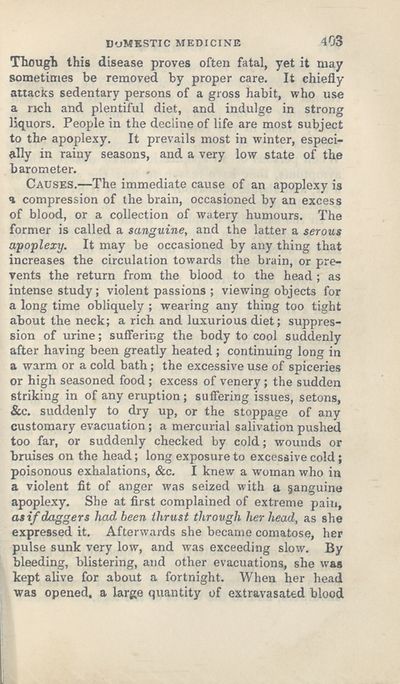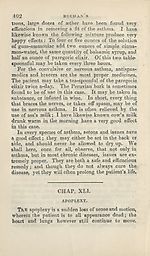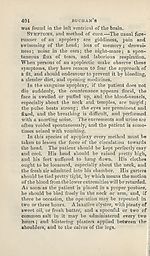Diseases > Domestic medicine
(437)
Download files
Complete book:
Individual page:
Thumbnail gallery: Grid view | List view

domestic medicine 403
Though this disease proves often fatal, yet it may
sometimes be removed by proper care. It chiefly
attacks sedentary persons of a gross habit, who use
a nch and plentiful diet, and indulge in strong
liquors. People in the decline of life are most subject
to the apoplexy. It prevails most in winter, especi¬
ally in rainy seasons, and a very low state of the
barometer.
Causes.—The immediate cause of an apoplexy is
» compression of the brain, occasioned by an excess
of blood, or a collection of watery humours. The
former is called a sanguine, and the latter a serous
apoplexy. It may be occasioned by any thing that
increases the circulation towards the brain, or pre¬
vents the return from the blood to the head; as
intense study; violent passions ; viewing objects for
a long time obliquely ; wearing any thing too tight
about the neck; a rich and luxurious diet; suppres¬
sion of urine; suffering the body to cool suddenly
after having been greatly heated ; continuing long in
a warm or a cold bath; the excessive use of spiceries
or high seasoned food; excess of venery; the sudden
striking in of any eruption; suffering issues, setons,
See. suddenly to dry up, or the stoppage of any
customary evacuation ; a mercurial salivation pushed
too far, or suddenly checked by cold; wounds or
bruises on the head; long exposure to excessive cold;
poisonous exhalations, &c. I knew a woman who in
a violent fit of anger was seized with a sanguine
apoplexy. She at first complained of extreme pain,
asif daggers had been thrust through her head, as she
expressed it. Afterwards she became comatose, her
pulse sunk very low, and was exceeding slow. By
bleeding, blistering, and other evacuations, she was
kept alive for about a fortnight. When her head
was opened, a large quantity of extravasated blood
Though this disease proves often fatal, yet it may
sometimes be removed by proper care. It chiefly
attacks sedentary persons of a gross habit, who use
a nch and plentiful diet, and indulge in strong
liquors. People in the decline of life are most subject
to the apoplexy. It prevails most in winter, especi¬
ally in rainy seasons, and a very low state of the
barometer.
Causes.—The immediate cause of an apoplexy is
» compression of the brain, occasioned by an excess
of blood, or a collection of watery humours. The
former is called a sanguine, and the latter a serous
apoplexy. It may be occasioned by any thing that
increases the circulation towards the brain, or pre¬
vents the return from the blood to the head; as
intense study; violent passions ; viewing objects for
a long time obliquely ; wearing any thing too tight
about the neck; a rich and luxurious diet; suppres¬
sion of urine; suffering the body to cool suddenly
after having been greatly heated ; continuing long in
a warm or a cold bath; the excessive use of spiceries
or high seasoned food; excess of venery; the sudden
striking in of any eruption; suffering issues, setons,
See. suddenly to dry up, or the stoppage of any
customary evacuation ; a mercurial salivation pushed
too far, or suddenly checked by cold; wounds or
bruises on the head; long exposure to excessive cold;
poisonous exhalations, &c. I knew a woman who in
a violent fit of anger was seized with a sanguine
apoplexy. She at first complained of extreme pain,
asif daggers had been thrust through her head, as she
expressed it. Afterwards she became comatose, her
pulse sunk very low, and was exceeding slow. By
bleeding, blistering, and other evacuations, she was
kept alive for about a fortnight. When her head
was opened, a large quantity of extravasated blood
Set display mode to:
![]() Universal Viewer |
Universal Viewer | ![]() Mirador |
Large image | Transcription
Mirador |
Large image | Transcription
| Antiquarian books of Scotland > Diseases > Domestic medicine > (437) |
|---|
| Permanent URL | https://digital.nls.uk/119893386 |
|---|
| Description | Thousands of printed books from the Antiquarian Books of Scotland collection which dates from 1641 to the 1980s. The collection consists of 14,800 books which were published in Scotland or have a Scottish connection, e.g. through the author, printer or owner. Subjects covered include sport, education, diseases, adventure, occupations, Jacobites, politics and religion. Among the 29 languages represented are English, Gaelic, Italian, French, Russian and Swedish. |
|---|

